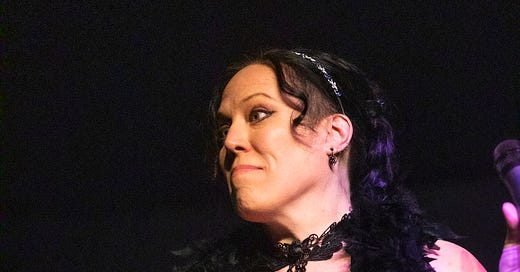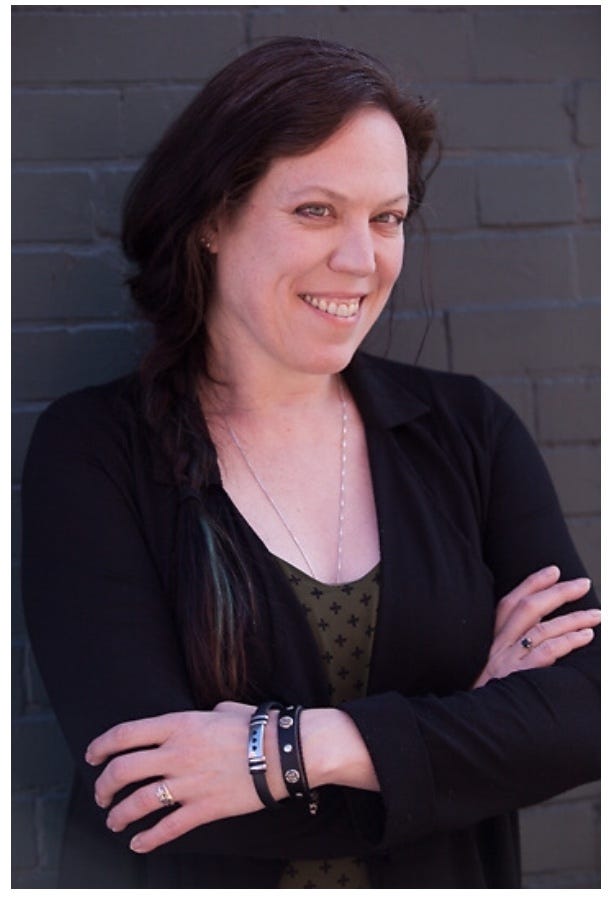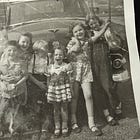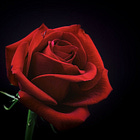Art and Mental Health Interview with Writer and Actor Jenn Zuko
How writing, acting and the combat arts have been healing for this neuro-spicy creative and others around her

Today’s interview is with
of . I asked her to give us a brief introduction to herself and she shared:“I’m a humanities adjunct professor, teaching writing and theatre arts.”
Which is true, but you can tell just from a glance at her Substack that she’s so much more:
If that doesn’t make you want to know more, I’m not sure what will. One of the things that delights me most about her Substack is how she introduces us to amazing new vocabulary words. And we have more to learn from Jenn! In this interview, she shares how writing, acting and the combat arts have been healing for her and for others around her but also what the shadow side looks like in terms of challenges.
Hi Jenn. Thanks for being here. We’re going to talk about art and mental health today.
A reminder for everyone before we begin, when I use the term “mental health” I sometimes mean things with a diagnosis and symptoms but more often I just mean something akin to “how the challenges of life are affecting our thoughts and experiences.” And that, in turn, affects our creativity. And so, I believe that all of us are artists and all face mental health challenges to varying degrees.
With that in mind, what would you like to share with us about your own experience of mental health?
I don’t have an official diagnosis, as I’ve not yet been able to afford mental health care. But I’ve been paying attention to my symptoms and have come to the conclusion that I am very likely what I’ve seen called ‘neuro-spicy,’ and may have an added mood disorder. But I’m also careful to not self diagnose, as I’m not a doctor, Jim, I’m a writer.
Smart. Most diagnosis is pretty hit or miss anyway, whether done professionally or intuitively.
So, what you do know about is being a writer. Tell us about that.
I’ve been an avid writer ever since I could put pen to paper, and I find that worldbuilding has been a lifesaver for me growing up. My theatre training, too, is a massively therapeutic process, and I get the feeling that acting training is actually the thing that’s kept me (relatively) sane.
And yet it’s probably had its challenging impacts on your mental health too … what might be an example of that?
In acting, we learn how to delve deep to get into character. Thing is, we often don’t learn how to come back up for air once we’re done. Since the beginning of my rigorous training experience, I’ve had to work through ways of doing this myself, without harm.
So you have a few creative mediums, but mostly your art is writing. How does writing interact with mental health?
Weirdly, I feel like the more I write about my personal stories, the more it helps others. So like: my not-so-great mental health, when expressed well, impacts my readers (and watchers) positively. If that makes sense.
That definitely makes sense. And it’s really powerful. Can you say a bit more about that?
When I shared my memoir concept and sample with two different journalists, they changed their awful life situation for the better. I like to joke that my book has saved lives already, and it’s not even published yet.
How has what you choose to write about been impacted by your mental health?
Well, I finished a memoir last summer, which centered on my experience of abuse from a narcissistic husband and an exploitative career, in tandem. That went so well (and I’m so happy with the result) that now I write almost exclusively personal essay. And it’s damn good stuff, which is not something I’d have expected even a year ago.
What was your experience of writing that memoir?
The biggest takeaway I have from completing the memoir is that the process assisted me in understanding what was done to me, that it wasn't my fault, that I'm not the crazy one (not for that reason anyway) and also in noticing the ways in which what happened still affects me, allowing me to work on changing my kneejerk reactions and finally standing up for my self and my worth.
I love that. What have been other healing benefits of your creativity?
The personal essay as healing journal is pretty straightforward and quite true. What might be less obvious is my time in the combat arts—fighting as therapy. That has been quite, quite healing for me, in a few ways I’ve written about before.
How would you say your experiences with neurodiversity or mood disorders have impacted your identity?
I don’t know that they have, other than the tortured genius artist myth. Sometimes I fall into that, especially did as a young person, though I don’t fall for it nearly as much anymore.
How about the perception of you by others?
See above ‘tortured artist’ myth. Though I did notice in the theatrical arts in particular, I tend to gather an admiring following pretty quickly.
In what ways has creating art hindered or harmed your mental health?
I don’t know that it has, unless you count drinking way too much alcohol in college.
I actually do think there’s often an intricate relationship between creativity, mental health and substance use.
Jenn shares a little more about this in a piece called Discipline:
“The fact that I began my drinking habits in college ain’t no coincidence, either. See, this good prof and the others showed us how to find that dark pool inside our psyche and jump in. But what they didn’t teach us was how to swim, get out, and dry off. Many of us stewed in our own juices too much and couldn’t cope. Some of us drowned. Most of us took to drink. I was an odd one—also a writer, I found writing to help in that drying-off process as well as the drink. I was the only undergrad allowed into a graduate level poetry workshop one late semester at the end of my BFA time. All ways of dealing with the discipline of intense training. Looking back on it now, it makes me wish we had an after-care system, like what BDSM practitioners do for each other after that particular type of good pain. It seems that these days, with the advent of the Intimacy Coordinator in theatre and their much more sophisticated paths through difficult work into safety, that today’s deep work is supported and allowed to heal much more completely. Though part of me does wish that my young self in the ‘90s had some after-care, a bigger part of me is proud of that girl, and feels extra tough, and capable, because of what she ground through. Disciplined. Talented (which is exactly what training is, it’s not magic, and not inborn).”
I resonate with the dichotomous feelings of “how I wish young me had some of the softness kids today often seem to experience” and “Proud Gen X kid who honors and celebrates the beauty in that toughness.” Mostly, I do think that access to more emotional intelligence would have allowed me to begin healing much sooner but also probably differently and the way that I am is the way that I am. But I digress …
Okay, so maybe making art hasn’t gone so far as harming you, but in what ways has it been complicated or stressful?
It’s very hard work for me sometimes, especially when I am writing personal stories—once in a while I just run out of emotional gas and have to go to a different topic.

In your own words, what do you think is the relationship between art and mental health?
Well, I believe art is essential to being human. It’s required for human well-being.
Are there any artists I should be studying to learn more about the relationship between art and mental health? Or any books or other resources that come to mind?
I taught a course at my work called Writing and Healing, and the central textbook for that is a lovely writing manual called Writing As A Way Of Healing by Louise deSalvo. It’s a really helpful book when it comes to personal writing.
Connect with Jenn Zuko. You can find her by name on most social media, including Facebook, Threads, and TikTok. And don’t forget to subscribe to
.A few of my favorite pieces by Jenn:
If you read this far, perhaps you liked the work. The work does take work. It only continues with support, so please consider subscribing. My annual rate starts at $10 per year.










